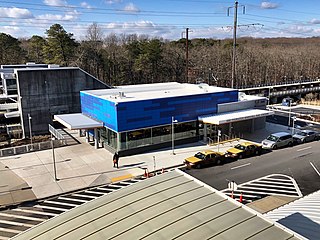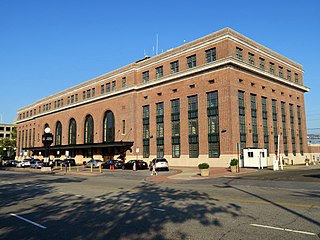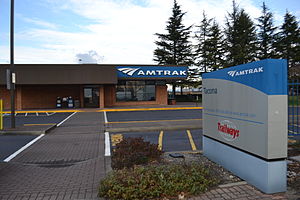
King Street Station is a train station in Seattle, Washington, United States. It is served by Amtrak's Cascades, Coast Starlight, and Empire Builder, as well as Sounder commuter trains run by Sound Transit. The station also anchors a major transit hub, which includes Link light rail at International District/Chinatown station and Seattle Streetcar service. It is located at the south end of Downtown Seattle in the Pioneer Square neighborhood, near the intersection of South Jackson Street and 4th Avenue South, and has four major entrances. It is the 15th-busiest station on the Amtrak system, serving as the hub for the Pacific Northwest region.

The Amtrak Cascades is a passenger train route in the Pacific Northwest, operated by Amtrak in partnership with the U.S. states of Washington and Oregon. It is named after the Cascade mountain range that the route parallels. The 467-mile (752 km) corridor runs from Vancouver, British Columbia, through Seattle, Washington, and Portland, Oregon, to Eugene, Oregon.

The Coast Starlight is a long-distance passenger train operated by Amtrak on the West Coast of the United States between Seattle and Los Angeles via Portland and the San Francisco Bay Area. The train, which has operated continuously since Amtrak's formation in 1971, was the first to offer direct service between Seattle and Los Angeles. Its name is a combination of two prior Southern Pacific (SP) trains, the Coast Daylight and the Starlight.

BWI Rail Station is an intermodal passenger station in Linthicum, Maryland near Baltimore/Washington International Airport (BWI). It is served by Amtrak Northeast Corridor intercity trains, MARC Penn Line regional rail trains, and several local bus lines.

New Haven Union Station is the main railroad passenger station in New Haven, Connecticut. It is the third such station in the city of New Haven, preceded by both an 1848 built station in a different location, and an 1879 built station near the current station's location. Designed by noted American architect Cass Gilbert, the present beaux-arts Union Station was completed and opened in 1920 after the previous Union Station was destroyed by fire. It served the New York, New Haven and Hartford Railroad for the next five decades, but fell into decline following World War II along with the United States railroad industry as a whole.

Richmond Main Street Station, officially the Main Street Station and Trainshed, is a historic railroad station and office building in Richmond, Virginia. It was built in 1901, and is served by Amtrak. It is also an intermodal station with Richmond's city transit bus services, which are performed by Greater Richmond Transit Company (GRTC). The station is colloquially known by residents as The Clock Tower. It was listed to the National Register of Historic Places in 1970, and in 1976 was made a U.S. National Historic Landmark. Main Street Station serves as a secondary train station for Richmond providing limited Amtrak service directly to downtown Richmond. Several Amtrak trains serving the Richmond metropolitan area only stop at the area's primary rail station, Staples Mill Road which is located five miles to the north in Henrico County.

The Kelso Multimodal Transportation Center is an Amtrak train station located near downtown Kelso, Washington, United States. The station also serves the neighboring city of Longview, which is located just across the Cowlitz River. The station is served by Cascades and Coast Starlight trains. Greyhound Lines provides national and regional bus service, while RiverCities Transit provides local transit. Shuttle vans, taxis and rental cars can also be hired at the station.

Sacramento Valley Station is an Amtrak railway station in the city of Sacramento, California, at 401 I Street on the corner of Fifth Street, built in 1926 on the site of China Slough. It is the thirteenth busiest Amtrak station in the country, and the second busiest in the Western United States. It is served by four different Amtrak train routes and connecting Amtrak Thruway motorcoaches. It is also the western terminus for the Gold Line of the SacRT light rail system and the Route 30 bus serving California State University, Sacramento.

Old Town Transit Center, also known as San Diego–Old Town station, or Old Town San Diego station, is an intermodal transportation station in the Old Town neighborhood of San Diego, California. It is served by Amtrak's Pacific Surfliner, the COASTER commuter rail service, and the San Diego Trolley, as well as numerous San Diego Metropolitan Transit System bus lines.

Auburn station is an Amtrak station in Auburn, California. Located at the corner of Nevada Street and Fulweiler Street, it serves as the northern terminus of the Capitol Corridor line. The station is not staffed. The platform is next to a short spur track off Track 2 of Union Pacific Railroad's route over Donner Pass. Because of the geography of the city, the Union Pacific's mainline tracks are split, with Track 1 running through the eastern side of the city and Track 2 crossing the western side of the city. The California Zephyr bypasses the city on its route between Roseville and Colfax primarily via Track 1. Auburn became a stop on Amtrak's Capitol Corridor in January 1998.

The John D. Dingell Transit Center, also known as the Dearborn Transit Center, is an intermodal transit station in Dearborn, Michigan. It is served by Amtrak's Wolverine line as well as Suburban Mobility Authority for Regional Transportation (SMART) buses. The station is named after former U.S. Representative John Dingell.

Edmonds station is a train station serving the city of Edmonds, Washington, in the United States. The station is served by Amtrak's Cascades and Empire Builder routes, as well as Sound Transit's N Line, a Sounder commuter rail service which runs between Everett and Seattle. It is located west of Downtown Edmonds adjacent to the city's ferry terminal, served by the Edmonds–Kingston ferry, and a Community Transit bus station. Edmonds station has a passenger waiting room and a single platform.

South Bend is a train station in South Bend, Indiana. It is served by Amtrak's Lake Shore Limited between Chicago, Boston and New York City, and Floridian between Chicago and Miami. The station was built by the Chicago South Shore and South Bend Railroad in 1970; South Shore Line trains continued to use it until 1992.

Fairhaven Station, also called Bellingham, is a train station serving Amtrak's Cascades route, as well as a bus station serving Greyhound Lines and local Whatcom Transportation Authority buses, in Bellingham, Washington, United States. Built in 1995, the station is located near the Bellingham Cruise Terminal, the southern connection for the Alaska Marine Highway. Water Taxi services and seasonal whale watching excursions also provide connections from the Bellingham Cruise Terminal to the San Juan Islands.

Pomona–Downtown station, is a train station in Pomona, California, United States. It is primarily served by Metrolink’s Riverside Line commuter rail service. The station is also served by limited Amtrak long-distance inter-city rail service, with the thrice-weekly round trip of the combined Sunset Limited/Texas Eagle. It is owned and operated by the city of Pomona.

Skagit Station is a multimodal transportation hub in Mount Vernon, Washington, United States served by Amtrak, and local transit agencies. The facility at 105 East Kincaid Street was built in 2004 to replace the former Amtrak station on 725 College Way, which is currently used as a yard office by BNSF Railway.

Tacoma Dome Station is a train station and transit hub in Tacoma, Washington, United States. It is served by Amtrak trains, the S Line of Sounder commuter rail, the T Line of Link light rail, and buses on local and intercity routes. Located near the Tacoma Dome south of Downtown Tacoma, the station consists of two train platforms used by Sounder and Amtrak trains, a platform for the T Line, a bus terminal, and two parking garages. The Sounder station is integrated into Freighthouse Square, a former Milwaukee Road depot that was converted into a shopping mall, and is on the east side of the Amtrak station.

Lakewood station is a commuter rail station in Lakewood, Washington, United States. It is the terminus of the S Line of the Sounder commuter rail network, operated by Sound Transit in the Seattle metropolitan area. The station, located along Pacific Highway Southwest, includes a 620-stall parking garage and several bus bays served by Intercity Transit and Sound Transit Express. Lakewood station was originally scheduled to open in 2002 as part of a Sounder extension, but plans were delayed due to funding issues and the state government's work on the Point Defiance Bypass project. Construction on the $33 million station and garage began in March 2007 and it opened for use by buses on September 18, 2008. Sounder service to Lakewood began in October 2012 and the pedestrian bridge opened a few months later.

On December 18, 2017, Amtrak Cascades passenger train 501 derailed near DuPont, Washington, United States. The National Transportation Safety Board's (NTSB) final report said regional transit authority Sound Transit failed to take steps to mitigate a curve at the accident location, and inadequately trained the train engineer. The train was making the inaugural run of the Point Defiance Bypass, a new passenger rail route south of Tacoma, Washington, operated by Amtrak in partnership with state and local authorities in Oregon and Washington, on right-of-way owned and operated by Sound Transit. The bypass was intended to reduce congestion and separate passenger and freight traffic, and was designed for faster speeds and shorter travel times, saving ten minutes from Seattle to Portland compared with the previous route used by Cascades.

The Point Defiance Bypass is a 14.5-mile-long (23.3 km) rail line between the cities of DuPont and Tacoma in Pierce County, Washington. It was originally built by the Northern Pacific Railway – the Tacoma–Lakewood segment in 1874 as part of the Prairie Line, and the Lakewood–DuPont section in 1891. Passenger service on the lines declined after the 1914 completion of a flatter route along Puget Sound, and ended entirely in 1956.





















